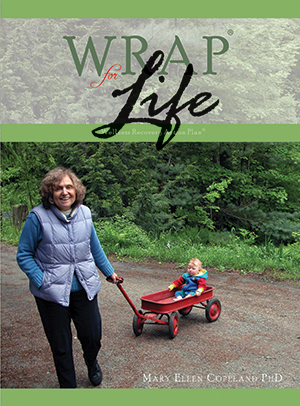Following is an excerpt from WRAP for Life.
 Sometimes in spite of your best efforts, you may feel worse. The situation could develop slowly or suddenly. You may feel very uncomfortable. You may be obsessed with thoughts of ending your life. It may be that an illness has worsened; you may have had an injury; or a stressful, traumatic event may have occurred. The situation may be serious, or even dangerous, but you are still able to take action on your own behalf.
Sometimes in spite of your best efforts, you may feel worse. The situation could develop slowly or suddenly. You may feel very uncomfortable. You may be obsessed with thoughts of ending your life. It may be that an illness has worsened; you may have had an injury; or a stressful, traumatic event may have occurred. The situation may be serious, or even dangerous, but you are still able to take action on your own behalf.
This is a critical time. It is necessary to take immediate action to protect yourself and to turn the situation around to prevent a Crisis. A Crisis means that you can no longer care for or make decisions for yourself and that you need intervention from others. To avoid a Crisis, you will need to take more intensive, structured, and directive action.
Responding when you are feeling this badly is much more difficult. It takes courage, trust, and persistence. During these times, it becomes very important to know how you recover and what you can do to help yourself feel better. You will be depending on the things you have learned about yourself in developing the first parts of this plan.
During this critical time, you may want to give yourself plenty of time to rest and heal. You might involve yourself in restful activities like gardening, walking in the woods, looking at something beautiful, or working on a creative project. You may want to put off taking on new projects like looking for a new job, starting school, beginning a new treatment, or starting a new therapy. There may be things you will want to avoid such as people and activities that are jarring, grating, wearing, upsetting, frustrating, hurtful, dangerous, or chaotic. You may want to give yourself time to talk about your situation with people who are supportive and comfortable to be with. You may want to take time for yourself – time to be alone. You may want to pay special attention to those times when you are becoming too tired. Respect your limits for physical, emotional, and mental stress.
When you notice the signs that Things are Breaking Down, go back to your list of Wellness Tools in your Wellness Toolbox and choose Tools that you think will help you feel better. Use these Tools to develop a plan that will help you feel better. The plan now needs to be very directive, with clear instructions and few choices. Some of the responses on your list may be the same as those you collected for responding to Triggers and Early Warning Signs. The difference is that now you may need to do these things more intensively, more often, and for longer periods of time.
The following list may help you develop your When Things are Breaking Down Action Plan. The activities, times, and length of involvement in these activities are only examples. Develop a specific list that will work for you.
When Things are Breaking Down, I need to do all of the following:
- Call my doctor or other health care professional and arrange an appointment within the next 24 hours
- Call my supporters and talk to them as long as I need
- Arrange for someone to stay with me and cook me healthy food until I feel better
- Make sure I am doing everything on my Daily Maintenance Plan
- Take at least 3 days off from any responsibilities
- Have at least 2 Peer Counseling sessions with a supporter each day
- Do 3 deep breathing relaxation exercises each day
- Spend 2 hours working on an art project
- Write in my journal for at least 30 minutes each day
- Watch movies that lift my spirits
- Play my guitar
- Exercise for at least 30 minutes
- Use hot packs at least 3 times during the day
I always think of this as a “hospital day” at home.
Because your intervention at this point is so important to avoiding a Crisis, you may want to review your When Things are Breaking Down Action Plan after you have used it to get through a difficult time.

Mary Ellen Copeland, PhD, developed Wellness Recovery Action Plan (WRAP) with a group of people with lived experience who were attending a mental health recovery workshop in 1997. She is the original author of the WRAP Red Book, as well as dozens of other WRAP books and materials. She has dedicated the last 30 years of her life to learning from people who have mental health issues; discovering the simple, safe, non-invasive ways they get well, stay well, and move forward in their lives; and then sharing what she has learned with others through keynote addresses, trainings, and the development of books, curriculums, and other resources. Now that she is retired, and that, as she intended, others are continuing to share what she has learned, she continues to learn from those who have mental health issues and those who support them. She is a frequent contributor to this site.





